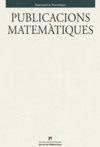刘维尔定理中最优幂的一个简单证明
IF 0.8
3区 数学
Q2 MATHEMATICS
引用次数: 1
摘要
考虑方程div$(\varphi^2 \nabla \sigma)=0$ 在 $\mathbb{R}^N,$ 在哪里 $\varphi>0$. 众所周知,如果存在的话 $C>0$ 这样 $\int_{B_R}(\varphi \sigma)^2 dx\leq CR^2$ 对于每一个 $R\geq 1$ 然后 $\sigma$ 必然是常数。在本文中,我们证明了如果进行替换,这个结果是不成立的 $R^2$ 通过 $R^k$ 为了 $k>2$ 在任何维度上 $N$. 这个问题与德·乔治的一个猜想有关。本文章由计算机程序翻译,如有差异,请以英文原文为准。
A simple proof of the optimal power in Liouville theorems
Consider the equation div$(\varphi^2 \nabla \sigma)=0$ in $\mathbb{R}^N,$ where $\varphi>0$. It is well-known that if there exists $C>0$ such that $\int_{B_R}(\varphi \sigma)^2 dx\leq CR^2$ for every $R\geq 1$ then $\sigma$ is necessarily constant. In this paper we prove that this result is not true if we replace $R^2$ by $R^k$ for $k>2$ in any dimension $N$. This question is related to a conjecture by De Giorgi.
求助全文
通过发布文献求助,成功后即可免费获取论文全文。
去求助
来源期刊
CiteScore
1.60
自引率
0.00%
发文量
29
审稿时长
>12 weeks
期刊介绍:
Publicacions Matemàtiques is a research mathematical journal published by the Department of Mathematics of the Universitat Autònoma de Barcelona since 1976 (before 1988 named Publicacions de la Secció de Matemàtiques, ISSN: 0210-2978 print, 2014-4369 online). Two issues, constituting a single volume, are published each year. The journal has a large circulation being received by more than two hundred libraries all over the world. It is indexed by Mathematical Reviews, Zentralblatt Math., Science Citation Index, SciSearch®, ISI Alerting Services, COMPUMATH Citation Index®, and it participates in the Euclid Project and JSTOR. Free access is provided to all published papers through the web page.
Publicacions Matemàtiques is a non-profit university journal which gives special attention to the authors during the whole editorial process. In 2019, the average time between the reception of a paper and its publication was twenty-two months, and the average time between the acceptance of a paper and its publication was fifteen months. The journal keeps on receiving a large number of submissions, so the authors should be warned that currently only articles with excellent reports can be accepted.

 求助内容:
求助内容: 应助结果提醒方式:
应助结果提醒方式:


